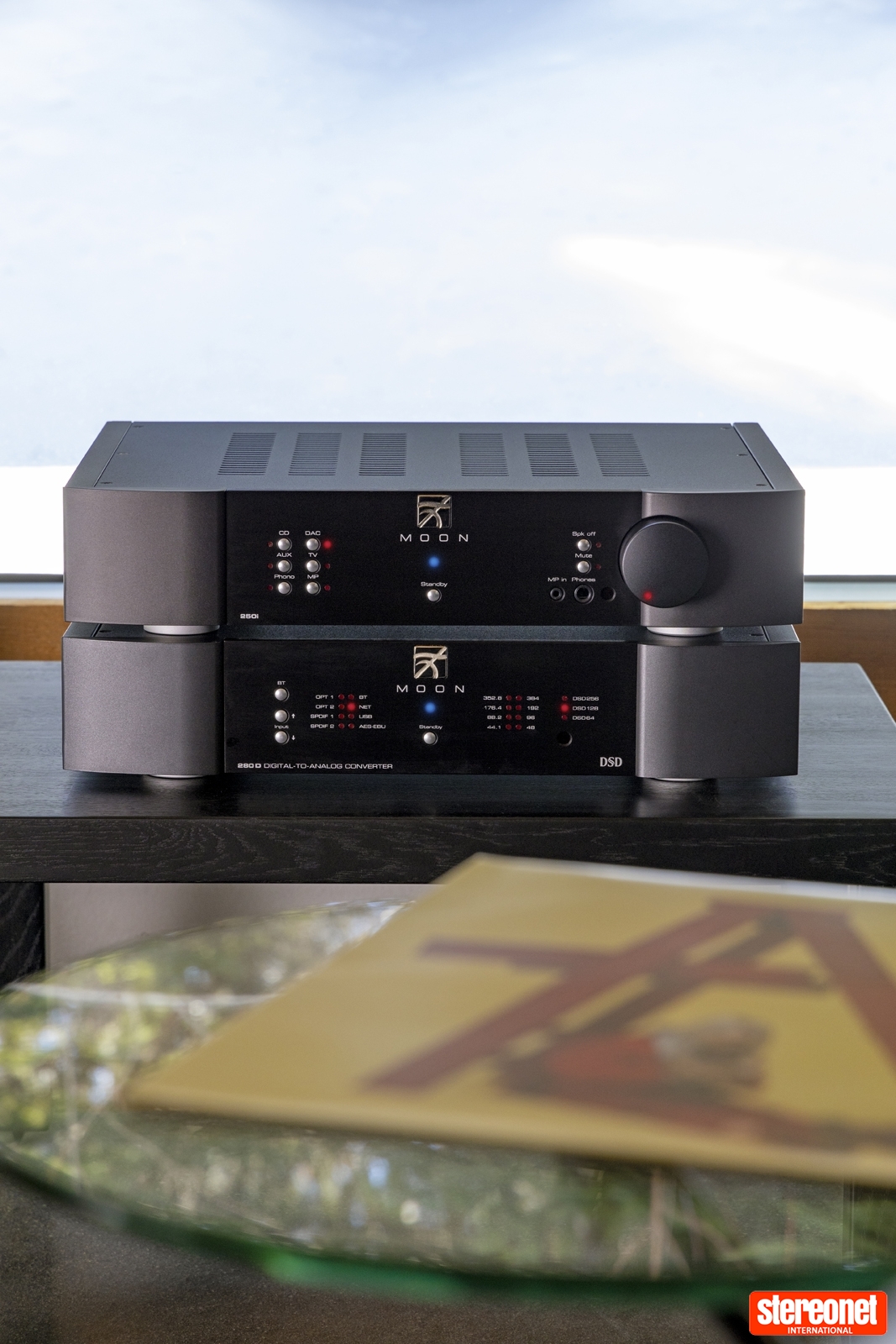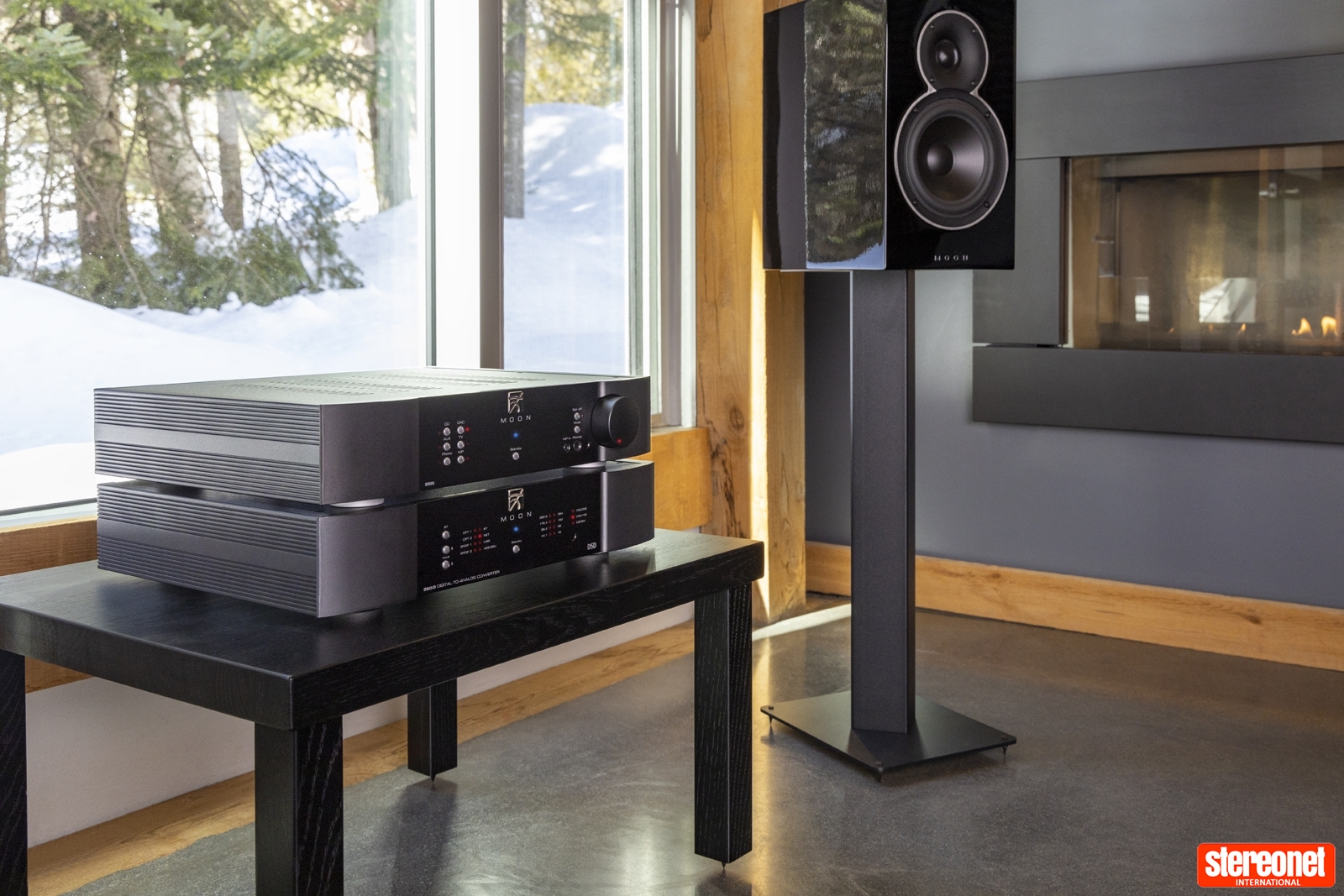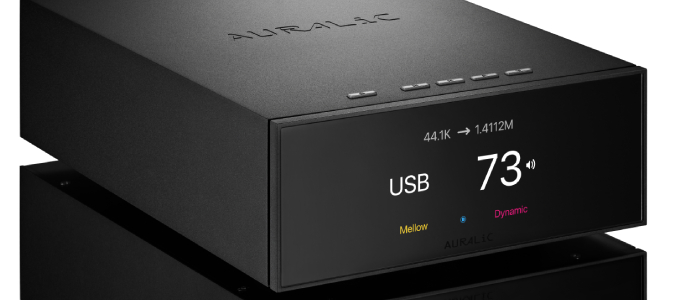Simaudio MOON 250i V2 Integrated Amplifier Review

David Price shines a light on this excellent affordable integrated amplifier…
Simaudio MOON
250i V2 Integrated Amplifier
USD $2,400

Judging by all the 'retro' products launched at this year's Munich High End Show, it seems the hi-fi industry is currently looking back at its past. Several new amplifiers are basically reboots of classic eighties integrateds, devoid of mod cons like DACs and streaming cards. Yet Simaudio's MOON 250i v2 has never had them, despite being an update of a product that's been on sale for over a decade now. It was always a no-frills design in the mould of the original nineteen eighties Naim NAIT or Exposure X.
UP CLOSE
This is an unashamedly old-school integrated, even more so than its current Naim Nait XS 3 and Exposure 3510 rivals, among others. A thoroughly conventional Class AB design, it uses traditional discrete power transistors and contains not so much as a DAC inside it, let alone a streamer. It's tastefully styled, well-made, and finished in the company's native Canada. This new v2 version retains the original 250i's minimalist design approach, so it is not freighted with superfluous features. In terms of sonics, it is said to be “a major improvement upon the original version of the 250i”, according to Simaudio's Product Director, Dominique Poupart.
The 200 series is the second rung up the MOON ladder, one step above the 100 range and way below the flagship 800 in terms of pricing. “It's a tried and tested design featuring improved execution. It is built to deliver the best possible performance at this price point”, says Dominique. “The v2 features our custom-made linear transformer with audiophile capacitors designed to reach our high-performance level standards. The results can be clearly heard…”

The most significant change to the new v2 is the redesigned main board, with the addition of a moving magnet phono section. “Driven by market demand, we believed this new feature would be much appreciated by the potential buyer of such a product”, Dominique explains. “The basic circuit topology is similar to the previous one and uses the same proprietary MOON output bipolar transistors. However, all the low-power transistors in the circuit are of a newer generation and surface-mounted. This, combined with the new printed circuit board, gives better sound and allows a more efficient production process.”
Also featured on the new 250i v2 is additional internal shielding to reduce field effect from the power supply section to the main amplification stage. “This offers noise reduction and sonic performance improvements, particularly when using the internal phono stage.” Dominque adds: “The goal when creating the 250i v2 was to produce the very best amplifier at this price point. We have other products in our line up that feature DACs, such as the MOON 280D streaming DAC, which is the perfect partner for the 250i v2.”
This amplifier looks good and feels great to operate – as classy as any price rival and better than most. It sports six line inputs, including a 3.5mm jack for retro gadgets, plus a moving magnet phono stage selector and a 6.25mm headphone socket. To the right is a large volume control knob with an LED inset to indicate the listening level; underneath it is the stalk of a motorised ALPS potentiometer.

The chassis feels solid and doesn't vibrate when you rap it with your knuckles, and the amplifier runs surprisingly cool for a Class AB design. With a shipping weight of 10kg and measuring 429x89x366mm, the MOON should fit neatly into most hi-fi racks. Claimed output power is just 50W RMS per channel into 8 ohms, but listening tests suggest this is a conservative estimate. The company claims that at half the load (4 ohms), the 250i puts out twice the power.
“We choose to manufacture in Canada and have full control of our production and quality control,” explains Dominique. “We are proud of this, and it allows us to offer the ten year warranty. Indeed all of our electronics have been manufactured in-house for more than four decades. Every part is designed by us to fulfil a specific function. By controlling the manufacturing process here in Quebec, we're in control of the renowned MOON sound. Manufacturing in China does not always save money for a company that is looking for the very best sound reproduction.”
THE LISTENING
This is a highly capable integrated amplifier that will be instantly recognisable to fans of those classic, fuss-free, stripped-down solid-state designs of the nineteen eighties and nineties. From the moment you start listening, you get the feeling that it's here to do a job of work without messing around. Its character isn't showy or brash, but nor is it an overly laid-back design that sounds like it's in urgent need of a nap. In other words, the MOON engineering team has come up with a practical and enjoyable product that's up for having fun, no matter what music you care to play.
The 250i v2 presents as a very good Class AB design that's not that far away from UK amplifier specialist Exposure in its voicing. Perhaps it's a little more direct and to the point than the ever so slightly warm and fluffy style of the latter, but it's still in the same ballpark. Tonally it won't strip the wallpaper when you turn it up, nor break your listening room windows. Yet at the same time, it's fast, detailed and agile enough to make music magic.

For example, Judie Tzuke's Welcome to the Cruise came over in a balanced yet animated way. The key to this is the 250i v2's open midband; it does extremely well in this respect considering its sensible pricing. There is a good deal of detail, depth and dimensionality that makes classic seventies rock tracks like this live and breathe. The MOON doesn't, if you pardon the pun, beam elements of the recording out at you but instead invites you into a large and spacious recorded acoustic where you can look around and focus on what each musician is doing. It's very civilised, but don't mistake this for boring.
Although 'only' 50W RMS per side, don't assume that the 250i v2 is lacking in power. I used it to drive a succession of high-end loudspeakers, new and old, such as the Kerr Acoustics K200 and the Yamaha NS-1000M, respectively. Although both of these are relatively efficient, they ask serious questions of any amplifier's load-driving ability. The former, by the way, were regularly tripping the protection circuitry of a good budget amp that I had to hand, even at medium volumes. Yet the MOON didn't once complain and continued to run cool even at high listening levels, joyously belting out Simple Minds' New Gold Dream. This is a classic early eighties synth-driven rock song with a pounding bass guitar line, but the 250i v2 held on steady whilst appearing to have fun. The bottom end was fluid and tuneful and really drove the song along in a beguilingly musical way; poor amplifiers can squash all the life out of this track, but not so here.
So, with strong power delivery for a fifty-watt amp, fine depth and dimensionality, plus a crisp and clean midband and a gusty, fluid bass, we're off to a good start. The 250i v2 doesn't stop impressing when you examine its treble performance here either, although it's a little more 'matter of fact' than, say, the Naim Nait XS 3 in this respect. The latter has a slightly better defined and tactile sound with heavily struck hi-hat cymbals, for example, compared to the MOON. Yet I'd put the MOON ahead of Exposure's 3510 in the treble region, as the latter can sound opaque and lacking in bite. Again, the 250i v2 treads a canny middle path between its two estimable rivals. The drum work on Walking on the Moon by The Police was a treat, with this amplifier catching both the timbre of the cymbals and snare drum well and relaying the timing with great precision. The result was the inevitable foot-tapping that you get when you just can't stop yourself from connecting with the music.
If there's a criticism to be made of the MOON, then I'm struggling to find it. Its combination of refinement and even-handedness with insight and grip make it a great listening companion across all musical genres. The way it caught the soulful mood of Bobby Womack's Across 110 Street, for example, was impressive. Although a poor recording by today's standards, the 250 v2 picked through the mix and brought out the best of it. I loved the definition of those soaring strings and also the velvety richness of the vocal line. Underneath all this, the sheer pathos of the song was really well conveyed. In absolute terms, it lacks some transparency and could use some more power – but the same can be said of its price rivals, often more so.

THE VERDICT
 A slightly oddball but rather charming amplifier, this. It's not the world's greatest integrated, but its performance-to-price ratio really is good. If you don't need all the accoutrements of modern amplifiers – DACs, Bluetooth, power meters, etc. – then this makes a great case for itself. If only all affordable integrateds were as classy…
A slightly oddball but rather charming amplifier, this. It's not the world's greatest integrated, but its performance-to-price ratio really is good. If you don't need all the accoutrements of modern amplifiers – DACs, Bluetooth, power meters, etc. – then this makes a great case for itself. If only all affordable integrateds were as classy…
For more information visit MOON
David Price
David started his career in 1993 writing for Hi-Fi World and went on to edit the magazine for nearly a decade. He was then made Editor of Hi-Fi Choice and continued to freelance for it and Hi-Fi News until becoming StereoNET’s Editor-in-Chief.
Posted in:Amplifiers Integrated Amplifier Applause Awards 2023 Hi-Fi
Tags: moon simaudio
JOIN IN THE DISCUSSION
Want to share your opinion or get advice from other enthusiasts? Then head into the Message Forums where thousands of other enthusiasts are communicating on a daily basis.
CLICK HERE FOR FREE MEMBERSHIP
Trending
applause awards
Each time StereoNET reviews a product, it is considered for an Applause Award. Winning one marks it out as a design of great quality and distinction – a special product in its class, on the grounds of either performance, value for money, or usually both.
Applause Awards are personally issued by StereoNET’s global Editor-in-Chief, David Price – who has over three decades of experience reviewing hi-fi products at the highest level – after consulting with our senior editorial team. They are not automatically given with all reviews, nor can manufacturers purchase them.
The StereoNET editorial team includes some of the world’s most experienced and respected hi-fi journalists with a vast wealth of knowledge. Some have edited popular English language hi-fi magazines, and others have been senior contributors to famous audio journals stretching back to the late 1970s. And we also employ professional IT and home theatre specialists who work at the cutting edge of today’s technology.
We believe that no other online hi-fi and home cinema resource offers such expert knowledge, so when StereoNET gives an Applause Award, it is a trustworthy hallmark of quality. Receiving such an award is the prerequisite to becoming eligible for our annual Product of the Year awards, awarded only to the finest designs in their respective categories. Buyers of hi-fi, home cinema, and headphones can be sure that a StereoNET Applause Award winner is worthy of your most serious attention.






